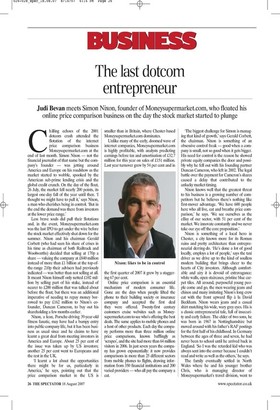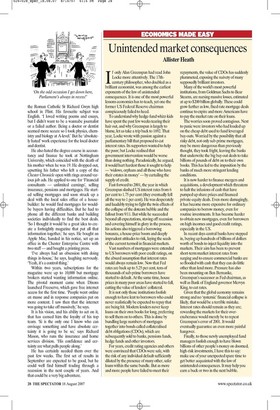The last dotcom entrepreneur
Judi Bevan meets Simon Nixon, founder of Moneysupermarket.com, who floated his online price comparison business on the day the stock market started to plunge Chilling echoes of the 2001 dotcom crash attended the flotation of the internet price comparison business Moneysupermarket.com at the end of last month. Simon Nixon — not the financial journalist of that name but the company's founder — was jetting around America and Europe on his roadshow as the market started to wobble, spooked by the American sub-prime lending crisis and the global credit crunch. On the day of the float, 26 July, the market fell nearly 200 points, its largest one-day fall of the year until then. 'I thought we might have to pull it,' says Nixon, a man who cherishes being in control. 'But in the end the demand was there from investors at the lower price range.'
Less brave souls did pull their flotations and, in the event, Moneysupermarket.com was the last IPO to get under the wire before the stock market effectively shut down for the summer. Nixon and his chairman Gerald Corbett (who had seen his share of crises in his time as chairman of both Railtrack and Woolworths) decided that selling at 170p a share — valuing the company at £840 million instead of more than £1 billion at the top-ofthe-range 210p their advisers had previously indicated — was better than not selling at all. It meant Nixon himself only netted £102 million by selling part of his stake, instead of nearer to £200 million that was talked about before the float; but there was an additional imperative of needing to repay money borrowed to pay £162 million to Nixon's cofounder, Duncan Cameron, to buy out his shareholding a few months earlier.
Nixon, a lean, Porsche-driving 39-year-old fitness fanatic, may have had a bumpy entry into public-company life, but it has been business as usual since and he claims to have learnt a great deal from meeting investors in America and Europe. About 25 per cent of the issue was taken up by US investors; another 25 per cent went to Europeans and the rest in the UK.
'I learnt a lot about the opportunities there might be for us, particularly in America,' he says, pointing out that the price comparison market in the US is smaller than in Britain, where Chester-based Moneysupermarket.com dominates.
Unlike many of the early, doomed wave of internet companies, Moneysupermarket.com is highly profitable, with analysts predicting earnings before tax and amortisation of £32.7 million for this year on sales of £151 million. Last year turnover grew by 54 per cent and in the first quarter of 2007 it grew by a staggering 67 per cent.
Online price comparison is an essential mechanism of modem consumer life. Gone are the days when people lifted the phone to their building society or insurance company and accepted the first deal they were offered. Twenty-first century customers cruise websites such as Moneysupermarket.com to see who's offering the best deals. The same applies to mobile phones and a host of other products. Each day the company performs more than three million online price comparisons, known bafflingly as 'scrapes', and the site had more than 64 million visitors in 2006. In just seven years the company has grown exponentially: it now provides comparisons in more than 25 different sectors from mobile phones to flights, drawing information from 350 financial institutions and 200 varied providers — who all pay the company a cut.
The biggest challenge for Simon is managing that kind of growth,' says Gerald Corbett, the chairman. Nixon is something of an obsessive control freak — good when a company is small, not so good when it gets bigger. His need for control is the reason he showed private equity companies the door and possibly why he fell out with his founding partner Duncan Cameron, who left in 2002. The legal battle over the payment for Cameron's shares caused a delay that contributed to the unlucky market timing.
Nixon knows well that the greatest threat to his business is a growing number of competitors but he believes there's nothing like first-mover advantage. 'We have 600 people here who all live, eat and breathe price comparison,' he says. 'We see ourselves as the eBay of our sector, with 51 per cent of the market. We innovate constantly and we never take our eye off the core proposition.'
Nixon is something of a local hero in Chester, a city known more for its Roman ruins and pretty architecture than entrepreneurial derring-do. 'He's done a lot of good locally, employs a lot of people,' says the taxi driver as we drive up to the kind of soulless modern building that brings cheer to the hearts of City investors. Although comfortable and airy it is devoid of extravagance: white walls, open staircases, pristine blue carpet tiles. All around, purposeful young people come and go, the men wearing jeans and chinos and many imitating Nixon's long crew cut with the front upward flip a la David Beckham. Nixon wears jeans and a casual shirt matching his wide, wary grey eyes. His is a classic entrepreneurial tale, full of insecurity and early failure. The elder of two sons, he was born in 1967 in Nottinghamshire but moved around with his father's RAF postings for the first half of his childhood. In Germany between the ages of three and seven, he had never been to school until he arrived back in England. 'So I was the retarded kid who was always sent into the corner because I couldn't read and write as well as the others,' he says.
The family eventually settled in North Wales where he and his younger brother Chris, who is managing director of Moneysupermarket's travel division, went to the Roman Catholic St Richard Gwyn high school in Flint. His favourite subject was English 'I loved writing poems and essays, but I didn't want to be a wannabe journalist or a failed author. Being a doctor or dentist seemed more secure so I took physics, chemistry and biology at A-level.' But he 'absolutely hated' work experience for the local doctor and dentist.
He also hated the degree course in accountancy and finance he took at Nottingham University, which coincided with the death of his mother when he was 19. He dropped out, upsetting his father who left a copy of the Chester Chronicle open with rings around various job ads. He applied to one for 'Financial consultants — unlimited earnings', selling insurance, pensions and mortgages. He started selling mortgages and soon struck up a deal with the local sales office of a housebuilder: he would find mortgages for wouldbe buyers having difficulties. But he had to phone all the different banks and building societies individually to find the best deals. 'So I thought it would be a great idea to create a fortnightly magazine that put all that information together,' he says. He bought an Apple Mac, handed in his notice, set up an office in the Chester Enterprise Centre with two staff — and bought a printing press.
'I've always had an obsession with doing things in-house,' he says, laughing nervously. 'Yeah, it's a control thing.'
Within two years, subscriptions for the magazine were up to 10,000 but mortgage brokers started wanting information online. The pivotal moment came when Dixons launched Freeserve, which gave free internet access for the first time. 'People went online en masse and in response companies put on more content. I saw then that the internet was going to take off massively,' he says.
It is his vision, and his ability to act on it, that has earned him the loyalty of his top team. 'Si is the only one I know who can envisage something and have absolute certainty it is going to be so,' says Richard Mason, who runs the insurance and home services division. 'His confidence and certainty are what pulls people along.'
He has certainly needed them over the past few weeks. The first set of results in September are expected to be good, but he could well find himself trading through a recession in the next couple of years. And that could be a very big adventure.













































 Previous page
Previous page